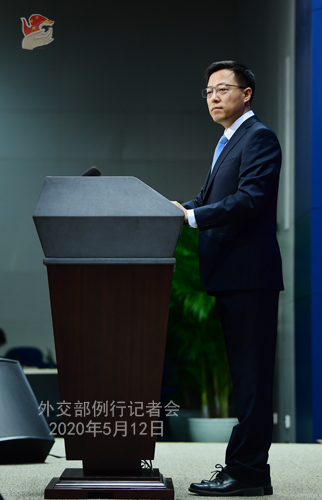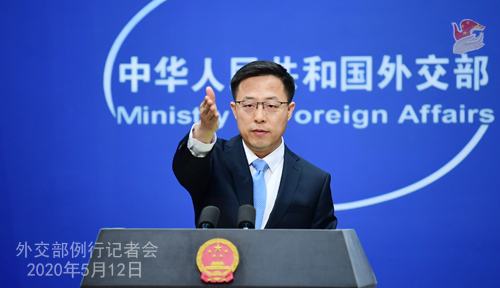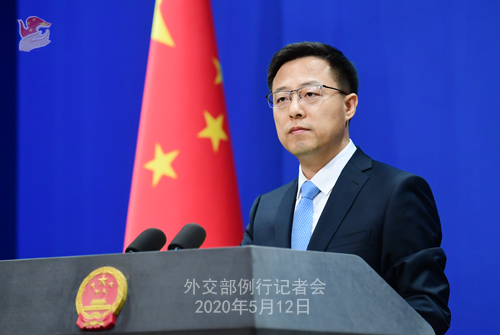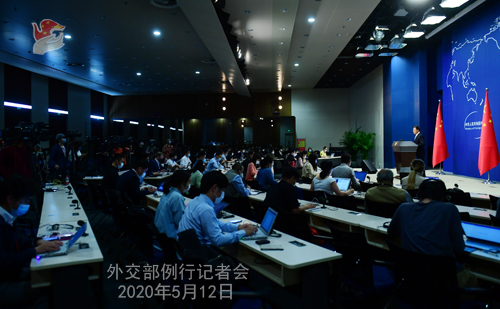| Foreign Ministry Spokesperson Zhao Lijian's Regular Press Conference on May 12, 2020 |
| 2020-05-12 20:57 |
|
State Councilor and Foreign Minister Wang Yi will attend in Beijing the Shanghai Cooperation Organization (SCO) Foreign Ministers' Video Conference on May 13. State Councilor Wang will hold in-depth discussions with foreign ministers of other SCO member states over such topics as cooperation in fighting COVID-19, international and regional situation, and next-stage development of the SCO. AFP: US President Trump said yesterday that he doesn't want to negotiate a new trade deal with China. He said that after some reports apparently mentioned the facts that China would like to negotiate a new trade deal. So has China any plan to negotiate a new trade deal with the US? Zhao Lijian: The conclusion of the China-US phase one trade deal serves the interests of China, the US and the world. The two sides should work together to implement the agreement following the principle of equality and mutual respect. Heads of the Chinese and US trade consultation teams had a phone conversation on May 8, agreeing to work towards creating enabling atmosphere and conditions for the implementation of the phase one trade deal and strive for more progress. ABC Australia: Four Australian beef exporters, according to the China's General Administration of Customs, have been put on a list which will not be allowed to export beef. We don't know what are the reasons for this. Is the Foreign Ministry able to provide any clarity on the reasons for this? And given that not long ago, the Chinese ambassador to Australia mentioned that Chinese consumers may not wish to consume Australian beef as they are upset about the Australian push for an independent international review of COVID-19 sources. This has been referred to by some as China's "economic coercion". Is this linked with the restrictions on beef import? Zhao Lijian: We have noted relevant reports. We have learned that China Customs detected repeated violations of inspection and quarantine requirements agreed by Chinese and Australian authorities in a few Australian companies' export of beef products to China. To safeguard Chinese consumers' health and safety, China has decided to suspend effective immediately, processing four Australian companies' import declarations for meat products. The relevant Australian department has been informed of this decision. The Chinese side has asked the Australian side to conduct a thorough investigation to find the cause and address the issue. You may get more specifics from the competent Chinese authorities. As you mentioned remarks by the Chinese ambassador to Australia, I want to stress that China always develops friendly cooperation with other countries based on mutual respect and equality. I suggest you carefully read the full text of the ambassador's interview. He was talking about the concerns that the Australian side's recent erroneous words and deeds have upset the Chinese people and that they may impact bilateral relations. Is there any problem with that? How could it have anything to do with "economic coercion"? The Australian side has been pushing for a so-called independent international review of the COVID-19 pandemic. We have repeatedly stated China's position on this. As is known by all, the issue of the origin and transmission of the virus needs to be assessed scientifically by medical professionals. Political maneuvers under the context of the pandemic will only disrupt international anti-virus cooperation and won't gain any support. Now as the world economy is bearing the full-blown impact of COVID-19, China stands ready to strengthen cooperation with other countries, enhance mutual assistance, and contribute to the health and well-being of all mankind. We also hope other countries will join China in promoting international cooperation and mutual trust, rather than say something nice while doing the opposite. Reuters: Joseph Wu made mention of a 2005 memorandum of understanding signed between China and WHO over the Taiwan region's participation in the organization. Media reports said that the MOU set Taiwan down as part of China. We're wondering if you could give us any more details about the said MOU and whether this still applies to Taiwan currently? Zhao Lijian: I'd like to stress two points. First, there is only one China in the world and the Taiwan region is an inalienable part of China's territory. There is no need for China to "set Taiwan down as part of China" by signing an MOU with any international organization. Second, there is no secrecy at all with the MOU signed between the Chinese government and WHO in 2005. You can find it online. Based on its provisions, under the one-China principle, participation in WHO technical activities by technical experts in the Taiwan region is unimpeded. Since 2019, 16 groups of 24 medical and health experts from the region have taken part in WHO technical activities. The Taiwan authorities are trying to hype up the MOU signed years ago in another show of political maneuvering under the pretext of the pandemic. This is nothing but a futile attempt.
The Australian: Can you disconnect very clearly that this problem with beef in China in the customs has nothing to do with Australia's interest in an independent scientific report into the origins of the coronavirus? Zhao Lijian: I just stated very clearly the Chinese government's position. Follow-up: You said political maneuvering under the pretext of the pandemic will not gain any support. It sounds to me that the two things were linked. Is that what you meant? Zhao Lijian: I already stated China's position on both issues. Xinhua News Agency: Could you talk about the work SCO member states have done in jointly fighting the COVID-19 pandemic? What are your expectations for this foreign ministers' video conference? Zhao Lijian: In the face of the COVID-19 challenge, SCO member states, upholding the Shanghai Spirit, conducted anti-virus cooperation, contributing to the the building of a community with a shared future for mankind through concrete actions. During the crucial period in China's fight against the virus, leaders of other SCO member states expressed sympathies and support to Chinese leaders and provided aid in the form of medical supplies. China also relates to the impact of the pandemic on other member states and has offered timely assistance to the best of its capability, including through multiple video conferences for experts to share experience in prevention and control, teams of medical experts and joint working groups who held exchange and offered guidance on site, and urgently-needed medical supplies. These have given a strong boost to other member states' fight against the pandemic. The SCO is a regional organization of significant influence. We believe all sides will build on the momentum of this conference to enhance solidarity and collaboration, deepen cooperation in various areas, and ensure that the SCO will contribute to a stronger global response to COVID-19 and to regional security and development. CNR: Information from the Office of the President of Afghanistan reportedly said on May 11 that Afghan President Ashraf Ghani and former Chief Executive Officer Abdullah Abdullah have agreed to establish a unity government. The two sides will sign a power-sharing agreement in the coming days. What is your comment? Zhao Lijian: As we say in China, "Neighbors wish each other prosperity and security". China and Afghanistan are neighbors enjoying long-established friendship and strategic partners of cooperation. We truly want to see Afghanistan realize peace and stability at an early date. The Chinese side has noted the latest development and commends the recent positive and constructive dialogues between the Ghani and Abdullah teams. We hope that the relevant parties in Afghanistan will put their nation and people first and establish an inclusive unity government at an early date, thus contributing to the country's COVID-19 response and promoting the peace and reconciliation process. The Australian: You just said that study of the origins of the virus requires specialists and scientists, not politics. At the moment there is a motion being put forward by the EU for the World Health Assembly, proposing an inquiry into the origins of the coronavirus. And the EU spokesperson said a thorough understanding of the pandemic is essential. They also said the Chinese side has not responded to their proposal. I wonder if you could explain what China's position is on their proposal? Does China support that? Zhao Lijian: China appreciates EU's efforts in promoting global cooperation in fighting COVID-19. We are taking an active part in relevant text consultations and hope a resolution with positive content will be adopted so as to send out to the world an important message of enhancing global solidarity, mobilizing resources, sharing experience and jointly fighting the pandemic. It is also our hope that all member states will participate in the text consultations in a constructive attitude. The Australian: The EU has been in consultation with the Australians on this. China seems to suggest there is political motivation behind Australia's push for the review but not the EU's? Why is that? Zhao Lijian: It's not the same thing. You should not view them together from a political angle.
The Globe and Mail asked me yesterday about the number of foreign journalists in China who have been given residence permits or press cards with a validity period of less than 12 months. I checked on that. There are nearly 500 foreign journalists stationed in China, and about 98 percent of them have residence permits or press cards with a validity period of 12 months. In other words, only about 2 percent of foreign journalists in China have credentials valid for less than 12 months. China has been providing convenience and assistance for foreign journalists in our country. Their application for extension of press cards is usually handled within 10 working days. With valid credentials, American journalists can enter and exit China multiple times without the need to apply for new visas. In last year alone, US journalists stationed in China made over 700 cross-border trips. For a while, the US, entrenched in the Cold War mentality and ideological bias, launched one round of suppression after another against Chinese media. The US has long been carrying out discriminatory policies on the Chinese journalists' visas. Journalists of other countries and regions can get multiple-entry visas while Chinese reporters can only get single-entry ones, which obstructs them from returning to the US after visiting their families back in China. Since 2018, the US has indefinitely delayed approval and even denied application of visa for 30 US-based Chinese journalists. When applying for visas, our reporters have to provide a lot of additional materials. In December 2018, it demanded a Chinese media organization's US office to register as "foreign agent". In February 2020, the US designated five Chinese media organizations in the US as "foreign missions" and then placed a cap on the number of their staff, in effect expelling 60 Chinese journalists. Now it is resorting to discriminatory restrictive visa measures, severely disrupting Chinese media's normal reporting in the US and affecting bilateral people-to-people and cultural exchange. We deplore and oppose that. I'd also like to point out many errors in the US DHS statement. It said nothing about the US wantonly pressuring Chinese journalists, and falsely claimed that "in 2018, the PRC effectively expelled Megha Rajagopalan, Buzzfeed News' China bureau chief". The fact is that Ms. Rajagopalan came to China in March 2017 on a J-2 visa, which only allows temporary stay, not as a resident journalist. So this means she shall leave when her visa expired. Let me stress this once again: China's fundamental state policy of opening-up is and will remain unchanged; we welcome foreign media and journalists reporting in China, and we will continue providing them with convenience and assistance. What we oppose is ideological bias towards China, fake news in the name of press freedom, and violation of professional ethics.
|
| |||||||||||||||
|
|||||||||||||||





